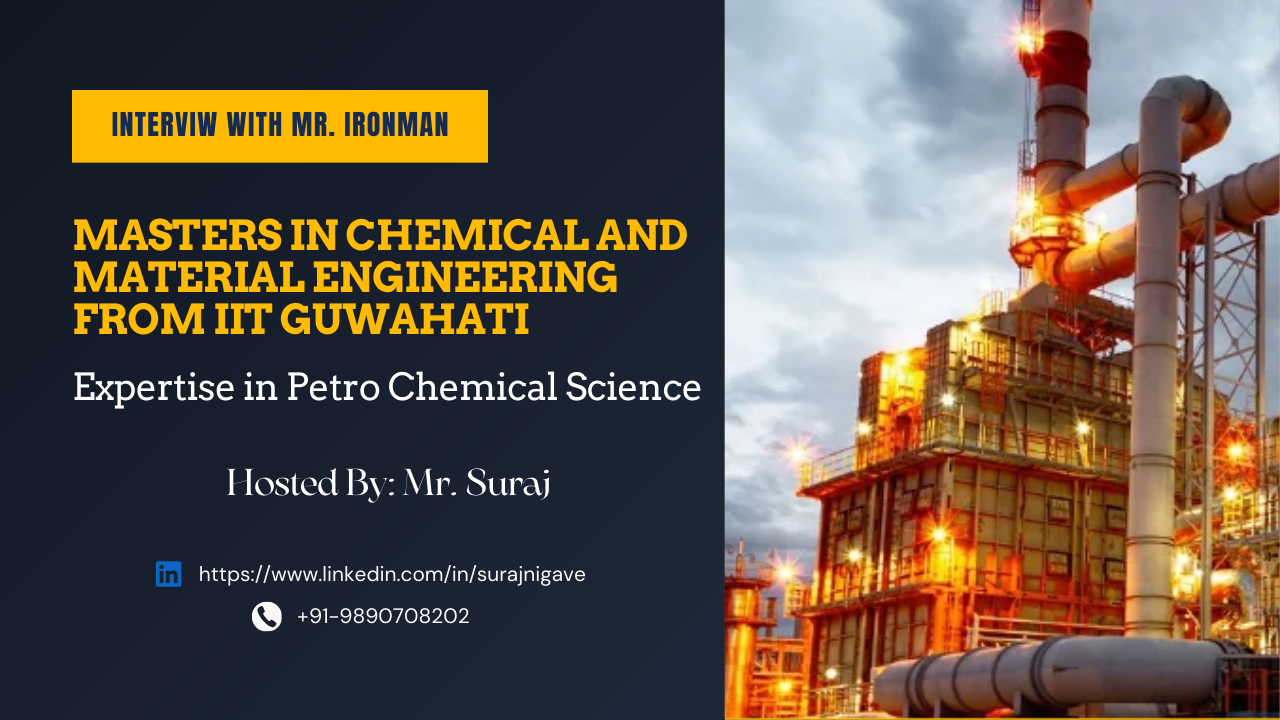Hello everyone,
My name is Ironman, and I'd like to share my experiences and insights from my journey in the field of chemical engineering. I hope that my story and the lessons I've learned can help guide students who are pursuing careers in chemical engineering, petrochemical engineering, material science, or related fields.
Choosing Chemical Engineering
I completed my bachelor's degree in chemical engineering. Choosing this field was a tough decision because, like many students in India, I didn't have much choice about pursuing engineering—it was expected. The challenging part was deciding which branch to choose. I believe proper counseling in high school is essential to help students make informed choices about their careers.
I had a passion for chemistry, so I chose chemical engineering. However, I soon realized that chemical engineering involves much more than just chemistry. There's actually only a little chemistry in chemical engineering; it's more about processes and systems. Despite this, I developed a passion for chemical engineering as I progressed through my bachelor's program.
I thoroughly enjoyed the subjects. I didn't just focus on getting good grades or memorizing information. Instead, I engaged deeply with the concepts and had in-depth discussions with my professors. This approach helped me truly understand and appreciate the field.
Engaging in Case Studies
During my bachelor's, I took part in many case studies with seniors who had graduated and were working in the industry. There are many websites and platforms that offer online competitions and case studies related to chemical engineering. Getting involved in these activities helped me explore the chemical engineering world beyond textbooks.
A typical case study might involve a scenario where someone wants to set up a plant and is seeking technical and commercial input from a chemical engineer. For example, someone might ask me, "Ironman, I want to set up a petrochemical division. Where should I locate it? How can I make it commercially viable? What value-added or finished goods can I produce?
To answer these questions, I had to consider factors like:
-
Location: Petrochemical plants need a lot of cooling water at temperatures between 20 to 35 degrees Celsius, so they are often located in coastal regions.
-
Processes and Operations: Understanding the unit processes and unit operations involved in producing products like ethylene, propylene, LPG, and high-speed diesel.
-
Market Analysis: Researching the prices and demand for these products.
-
Cost Calculations: Estimating capital expenditures (CAPEX) and operating expenses (OPEX).
Working on these case studies allowed me to apply theoretical knowledge from core subjects like heat transfer, fluid mechanics, mass transfer, and chemical reaction engineering to real-world problems. This deepened my understanding and prepared me for industry challenges.
Internship at Reliance Industries
In my third year, I was fortunate to secure a summer internship at Reliance Industries in their petrochemicals division. Reliance Industries is one of India's leading companies. I worked in the cracker unit, where naphtha is thermally cracked, and its components are separated and sent to other units for further processing, such as polypropylene and polyethylene units.
During my internship, I worked on a project and provided some recommendations that could be implemented. My contributions were appreciated, and a few months after my internship, I received a pre-placement offer (PPO) from Reliance Industries. This meant that after my fourth year, I had a job offer waiting for me.
In my fourth year, since I was already placed, I could have relaxed. However, I didn't stop pushing myself. I continued engaging in case studies and stayed connected with seniors who were working or pursuing higher education abroad. This helped me stay informed and think about my future steps.
Deciding to Pursue a Master's Degree
After working at Reliance Industries, I felt the need to enhance my skills and knowledge to reach a better position in my career. I decided to prepare for the GATE exam, which is a national-level exam in India for engineering graduates.
While working, I studied to refresh my knowledge of the subjects. I achieved a good rank in GATE, which opened the door for me to pursue a master's degree. I chose to do my master's at IIT Guwahati, one of India's premier institutes.
Pursuing a master's degree was a significant step for me. It allowed me to experience a different academic culture, work with well-equipped laboratories, and learn from experienced professors. I was curious about exploring new areas and wanted to contribute more meaningfully to my field.
Specializing in Material Science
In my master's program, I specialized in material science within the chemical engineering department. I made this decision because I saw a shift happening in India towards renewable energy, especially solar energy. India aims to become carbon neutral, and there is a growing need for renewable energy technologies.
Currently, India imports most of its solar cells from other countries like China. These cells are then assembled into modules for use in solar panels. However, there is a lack of full-scale integration in manufacturing the entire solar cell—from raw materials to the final product—within India.
I wanted to be part of this emerging industry. Material science is essential for producing components like metallurgical-grade silicon, polysilicon, silicon crystals (ingots), wafers, and cells that are used in solar panels. By specializing in material science, I could contribute to developing this industry in India.
I didn't choose to continue in petrochemical engineering because, in that field, there are standard operating procedures and less opportunity for innovation. I wanted to be in a field where I could innovate and make a significant impact.
Experience at IIT Guwahati
At IIT Guwahati, I studied both core chemical engineering subjects and material science subjects. This combination gave me a solid foundation and allowed me to explore new areas.
Some of the key subjects I focused on included:
-
Material Characterization: Learning how to study the properties and composition of materials using equipment like scanning electron microscopes (SEM), X-ray diffraction (XRD), inductively coupled plasma mass spectrometry (ICP-MS), and atomic absorption spectroscopy.
-
Computer-Aided Numerical Methods: This subject taught me how to solve complex equations using software like MATLAB. Not all problems can be solved with simple formulas; sometimes we need to solve partial differential equations numerically.
-
Computational Fluid Dynamics (CFD): Although a challenging subject, CFD is valuable for simulating how fluids behave under different conditions. It involves using software like COMSOL or OpenFOAM to model fluid flow and heat transfer.
-
Process Optimization: Learning how to make industrial processes more efficient and cost-effective.
-
Process Dynamics, Instrumentation, and Control (PDIC): Understanding how to control industrial processes using controllers and programmable logic controllers (PLCs). For example, maintaining water levels in tanks or controlling temperatures in reactors.
I also gained hands-on experience working with advanced laboratory equipment. IITs have well-equipped labs, which provided me with opportunities that might not be available in other institutions.
Being part of research groups and interacting with professors and fellow students allowed me to stay updated on current developments in the industry and academia.
Master's Thesis on Waste Management
For my master's thesis, I worked on waste management, specifically focusing on preventing microplastics from entering large water bodies.
The Problem:
Microplastics are tiny plastic particles that result from the breakdown of larger plastic waste due to mechanical forces and sunlight. They end up in rivers and oceans, harming marine life and entering the human food chain when we consume seafood. This poses serious health risks.
My Project:
I aimed to reduce the amount of microplastics entering water bodies by improving wastewater treatment processes. I worked on coagulation methods—both chemical and electrochemical—to trap microplastics before wastewater is released into the environment.
How It Works:
By adding an additional treatment unit to existing effluent treatment plants (ETPs), we can capture microplastics effectively. This process can reduce the amount of microplastics entering rivers and oceans by 90-95%.
What Happens to the Trapped Microplastics?:
The collected microplastics can be chemically treated and converted into other useful organic compounds like ethylene or propylene. This not only prevents environmental pollution but also recycles the waste into valuable products.
Current Status:
Such systems are not widely implemented yet, especially in India. Some countries are starting to adopt these methods, but more awareness and action are needed. I believe that as environmental concerns grow, these solutions will become more common.
Returning to Reliance Industries
After completing my master's, I had the opportunity to return to Reliance Industries through campus recruitment. During the interview, I explained how my new skills and knowledge could contribute to the company, especially in areas like renewable energy and advanced materials.
They appreciated my background and enthusiasm, and I was offered a position. I was happy to return to the industry with a fresh perspective and the ability to make a greater impact.
Advice for Students
Based on my experiences, here are some suggestions for students pursuing chemical engineering or material science:
-
Focus on Core Subjects:
-
Chemical Engineering: Prioritize subjects like heat transfer, mass transfer, fluid mechanics, chemical reaction engineering, and process dynamics, instrumentation, and control (PDIC).
-
Material Science: Focus on topics like crystallography, phase diagrams, and material characterization techniques. Understand the physical and chemical properties of materials.
-
Develop Practical Skills:
-
Gain hands-on experience with laboratory equipment. Learn how to operate instruments like SEM, XRD, and spectroscopy equipment.
-
Familiarize yourself with software tools like MATLAB for numerical methods and simulation software for CFD.
-
Engage in Case Studies and Projects:
-
Attend Events and Guest Lectures:
-
Take advantage of guest lectures, webinars, and industry events. These provide valuable insights from experienced professionals.
-
Even if it's tempting to skip these events, attending them can significantly impact your understanding and career direction.
-
Network and Make Connections:
-
Connect with seniors, alumni, and professionals in your field. They can offer guidance, mentorship, and opportunities.
-
Stay informed about industry trends, news, and where the world is moving in different industries.
-
Plan for the Future:
-
Ask yourself where you see yourself in the future. If you have an answer, that's great. If not, use that as motivation to explore, learn, and find your direction.
-
Consider emerging industries like renewable energy and think about how you can contribute.
-
Embrace Continuous Learning:
-
The fields of chemical engineering and material science are always evolving. Stay curious and open to learning new concepts and technologies.
-
Keep updating your skills to remain relevant in the industry.
Final Thoughts
I hope that sharing my journey helps you in your own. Pursuing a career in chemical engineering or material science offers many opportunities to make significant contributions, especially in emerging fields like renewable energy.
Remember, it's important to balance your academic studies with practical experiences and networking. Take advantage of the resources available to you, and don't hesitate to seek advice when needed.
Thank you for taking the time to read about my experiences. If you've made it this far, I hope that my insights, along with the efforts of those who organized this sharing, will be helpful to you.
I wish you all the best in your endeavors. Do well, and cheers to your future!
Warm regards,
Ironman


























